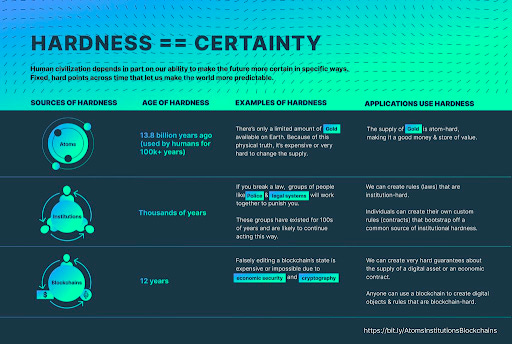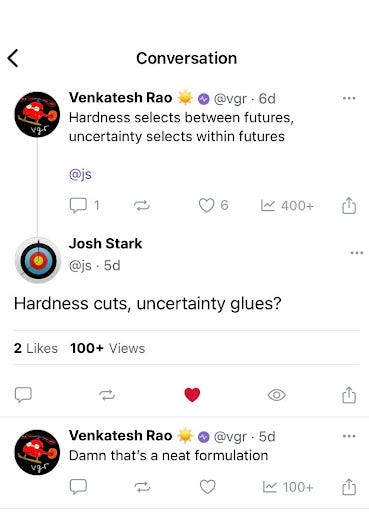This research note is part of the Clockless Clock book project.
I’ve mentioned Josh Stark’s notion of hardness before. His talk about it at Devconnect is now online, and worth a watch, and intelligible even if you lack the context to parse the crypto-specific bits. Kevin Owocki tweeted a nice graphic capturing the gist of the idea. Hardness is an affordance of certain natural and artificial phenomena that allows us to create certainty, and allows us “to make the future more certain in specific ways.”
In a brief exchange on Farcaster, Josh and I came up with an application of the idea of hardness to the nature of time.
In my formulation, hardness selects between futures, uncertainty selects within futures, I was trying to get at a sharp distinction between narratives that pick out clear counterfactuals, such as “What if the Axis powers had won World War 2,” and narratives that pick out a coherent perspective within the general, unsettled muddiness of real time, caused by the ambiguities and noise of real events, which make a definitive account of events impossible in practice, whether or not such accounts exist in some platonic realm in principle. The former is in the realm of bracketed speculation; the latter is in the realm of subjective opinion.
Think of it as Man in High Castle time vs. Rashomon time. I think most of us would agree that the former tale explores a proper counterfactual (though I can imagine a conspiracy theory arguing that the Axis secretly actually won and runs the world today), while the latter tale holds a sort of uncollapsed wave function of factual events in a contemplative reverie.
Josh’s elegant formulation hardness cuts, uncertainty glues, offers a visceral mental image of what’s going on. We’re really talking about forked time vs glued time.
The set of narratives that contend to be accepted as definitive accounts of the real (and cast doubt on rival accounts) can be considered glued time. The set of narratives that do not contend to be so accepted, and merely present themselves as interesting thought experiments about parallel realities, can be considered forked time. Forked time can be overtly fantastical or merely realistically unreal. There can be meta-contention over what sort of time specific events live in. Most of us consider the Apollo Moon missions and the 2020 US Presidential elections as existing in settled forked time, but a significant minority believes, or pretends to believe, that both exist in unsettled glued time.
Forked time is very thoroughly studied and understood. Glued time on the other hand, a concept I’ve been circling without naming in my thinking about time, is just beginning to attract serious philosophical and practical attention.
Keep reading with a 7-day free trial
Subscribe to Ribbonfarm Studio to keep reading this post and get 7 days of free access to the full post archives.



